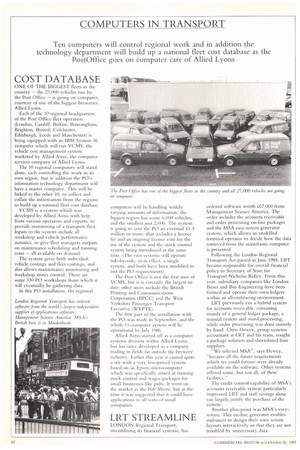Ten computers will control regional work and in addition the
Page 64

If you've noticed an error in this article please click here to report it so we can fix it.
technology department will build up a national fleet cost database as PostOffice goes on computer care of Allied Lyons
COST DATABASE
ONE OF THE BIGGEST fleets in the country — the 27,000 vehicles run by the Post Office — is going on computer, courtesy of one of the biggest breweries, Allied Lyons.
Each of the 10 regional headquarters of the Post Office fleet operation (London, Cardiff, Belfast, Birmingham, Brighton, Bristol, Colchester, Edinburgh, Leeds and Manchester) is being equipped with an IBM System 36 computer which will run VCMS, the vehicle cost management system marketed by Allied Aims, the computer services company of Allied Lyons.
The 10 regional computers will stand alone, each controlling the work in its own region, but in addition the PO's information technology department will have a master computer. This will be linked to the other 10, to collect and collate the information from the regions to build up a national fleet cost database.
VCMS is a system which was developed by Allied Aims with help from various operators and experts, to provide monitoring of a transport fleet. Inputs to the system include all workshop and vehicle performance statistics, to give fleet managers outputs on maintenance scheduling and running costs — all available on demand.
The system gives both individual vehicle costings and fleet costings, and also allows maintenance monitoring and workshop stores control. There are some 330 PO workshops from which it will eventually be gathering data.
In this PO installation, the regional
computers will be handling widely varying amounts of information: the biggest region has some 6,01)0 vehicles, and the smallest just 2,000. The system is going to cost the PO an eventual £1.5 million or more: that includes a licence fee and an ongoing licence cost for the use of the system and the stock control system being introduced at the same time. (The two systems will operate side-by-side, as in effect, a single system, and both have been modified to suit the PO requirements).
The Post Office is not the first user of VCMS, but it is certainly the largest to date: other users include the British Printing and Communications Corporation (BPCC) and the West Yorkshire Passenger Transport Executive (WYPTE).
The first part of the installation with the PO was made in September, and the whole 11-computer system will be operational by July 1986. Allied Aims started off as a computer systems division within Allied Lyons, but has since developed as a company trading in fields far outside the brewery industry. Earlier this year it caused quite a stir with a very low-priced system based on an Epson microcomputer which was specifically aimed at running stock control and wages packages for small businesses like pubs. It went on the market as the Pub Micro, but at the time it was suggested that it could have applications in all sorts of small companies.
LRT STREAMLINE
LONDON Regional Transport, streamlining its financial systems, has
ordered software worth £67,000 from Management Science America. The order includes the accounts receivable and order processing on-line packages and the MSA easy-screen generator system, which allows an unskilled terminal operator to decide how the data retrieved from the mainframe computer is presented.
Following the London Regional Transport Act passed in June 1984, LRT became responsible for overall financial policy to Secretary of State for Transport Nicholas Ridley. From this year, subsidiary companies like London Buses and Bus Engineering have been formed and operate their own ledgers within an all-embracing environment.
LRT previously ran a hybrid system for accounts receivable, consisting mainly of a general ledger package, a manual system and word processing, while order processing was done entirely by hand. Chris Dewey, group systems accountant at LRT and his team, sought a package solution and short-listed four suppliers.
"We selected MSA", says Dewey, "because all the future requirements which we could foresee were already available on the software. Other systems offered some, but not all, of these facilities."
The credit control capability of MSA's accounts receivable system particularly impressed LRT and staff savings alone can largely justify the purchase of the system.
Another plus-point was MSA's easyscreen. This on-line generator enables end-users to design their own screen layouts interactively so that they are not troubled by unnecessary data.








































































































